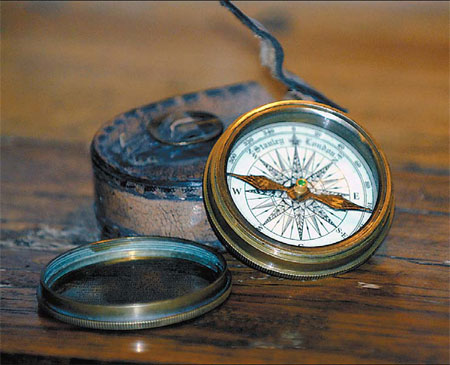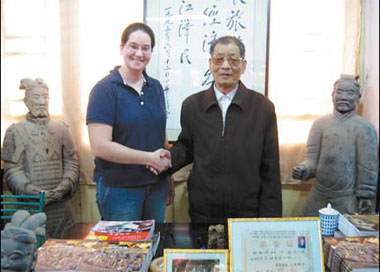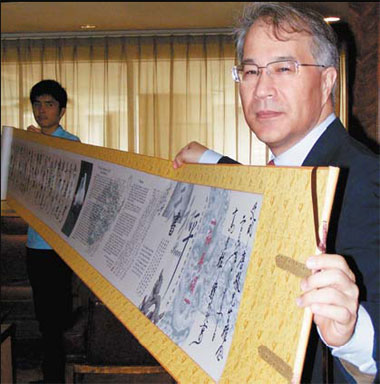My favorite China things
|
Canadian Nathan Ring's most prized discovery in China: an 1885 Stanley London Compass. |
My compass
Sometimes the road less traveled can lead to wondrous discoveries, a lesson Nathan Ring learned on his first journey to China two years ago.
As a lone traveler, 20-year-old Ring would often seek the path lesser sought, taking advantage of the individual freedom granted by his one-man status.
It was on one of his lone-wolf wanderings in western Hong Kong that the Canadian student stumbled upon an antique street where he discovered an 1885 Stanley London Compass, now one of his most prized possessions.
"Acquiring this item gave me a sense of accomplishment. It served as a symbol of my success at my own individual exploration," he says.
At first, Ring says, he couldn't justify the HK$400 ($51.2) price tag and was about to put the compass back when he saw a smile creep across the merchant's face.
"The shop owner saw the look of intrigue in my eye, took the HK$400 sticker off and threw it in the garbage," Ring recalls.
Instead he took the piece home for only HK$100.
The compass holds special significance to Ring because his deceased grandfather, whose name is also Stanley, served in the Canadian Navy and had the spirit of an explorer.
Imbuing the artifact with even more significance was the Robert Frost poem The Road Not Taken etched under the lid.
"Not following the crowds, listening blindly to recommendations, and taking the path less traveled; it really has made all the difference. Had I taken a guided tour of Hong Kong, I would have never had this compass," Ring says.
My poem
When Einar Tangen helped catalyze a cultural exchange between the United States and China two years ago, he didn't realize that he would be the recipient of his own priceless piece of Chinese culture.
After Tangen arranged a series of cultural exchanges between China and the States, former Chinese Minister of Culture, Gao Zhanxiang, showed his appreciation to Tangen by awarding him with a copy of the poem, Ode to Peace, signed by both Gao and Yang Liwei, China's first astronaut to reach outer space.
The original version of the poem, written by Gao, signifying China's desire to come in peace, accompanied Yang on China's first space mission.
"Minister Gao handed it to me personally and I was very touched at being given something so unique," Tangen says.
A copy of the poem was also presented to former US President George Bush Senior in honor of his trip to China.
It wasn't just receiving the rare relic that held significance; it was the man presenting it, says Tangen, who keeps the poem in glass case on a bookshelf in his Beijing home.
A man of the arts, Gao has made his name not only as a Chinese official but also as an artist, calligrapher, poet and photographer.
The 73-year-old has also won ballroom dancing awards, says Tangen.
As part of the cultural exchange, Gao will bring his talents to the States in the form of an art exhibition displaying his famous Lotus photographs.
My autograph
"I can say that I shook the hand of history," says American Emmy Hagman, "and his handshake was surprisingly firm."
That piece of history was Yang Xinman, one of the seven farmers who discovered the Terracotta Warriors.
|
American Emmy Hagman shakes hands with Yang Xinman, one of the discoverers of the Terracotta Warriors in Shaanxi province. |
While taking a go-cart tour in Xi'an, Shaanxi province, with her family two years ago, the 25-year-old English teacher managed to meet, greet and get the autograph of Yang.
Hagman says she owes the experience to their tour guide, whose expertise led them to the man.
At first Hagman thought the guide was just leading her into a souvenir shop, which she was reluctant to do, not wanting to buy any tourist trap trinkets.
But after entering and leaving the shop, the guide insisted, in a string of barely intelligible Chinese, that Hagman re-enter the shop.
Reluctantly Hagman tailed the tour guide back into the shop and was soon led around the corner, where she saw a man sitting at a simple wooden table guarded by two terracotta warriors.
"I didn't know who he was at first and only figured it out after reading the plaque that described him as 'the man that discovered the eighth wonder of the world'," Hagman says.
After taking several pictures with Yang, Hagman bought a book on Xi'an from the shop and had him autograph it. It is her most prized Chinese possession.
The book, which was brought back to the States by Hagman's family, now sits on a bookshelf in her father's office.
My godchild
Some of the best things money cannot buy.
No one knows this better than Ulrike Nieter, whose favorite Chinese treasure is her Chinese godchild, Harry.
The story behind the 52-year-old German's rise to god-parenthood is uncanny.
In 1997, Nieter was hiring summer interns for the German conglomerate she worked for at the time, and she hired a quiet young lady whose English name was Linda Zhang and whose Chinese name was Zhang Yi.
|
American Einar Tangen (right) shows a copy of the poem Ode to Peace, written by former Chinese Minister of Culture, Gao Zhanxiang. File photos |
Zhang began working for the company every other day, until one day a fresh face arrived in her place.
"I went to the girl and said to her 'You're not Linda Zhang' and the girl responded 'Yes, I am Linda Zhang'," Nieter says.
After a few moments of mystification, Nieter finally found that the girl was indeed named Linda Zhang and her Chinese name was also Zhang Yi but she was not the same Linda Zhang who had been there the previous Monday.
At first Nieter was angry that the original Zhang had found a replacement and somehow forgot to mention it to her.
But by the end of her first half hour with the new Linda, she found that the student had gumption and decided to give her a chance.
Within a week, Zhang had proven herself to be intelligent, reliable and agile, leaving Nieter impressed.
Soon the two started to develop a strong bond, and by the end of the internship Nieter did not want to see Zhang go.
As time progressed, Zhang and Nieter's relationship grew. Zhang soon found herself working as Nieter's assistant and when the opportunity arose for Zhang to work at the World Economic Forum, Nieter did everything she could to help.
Nieter now regards Zhang as the equivalent of a younger sister. The two are so close that when Zhang found out she was pregnant she immediately offered Nieter the position of godmother and the chance to name the child.
(China Daily 06/23/2008 page10)

















